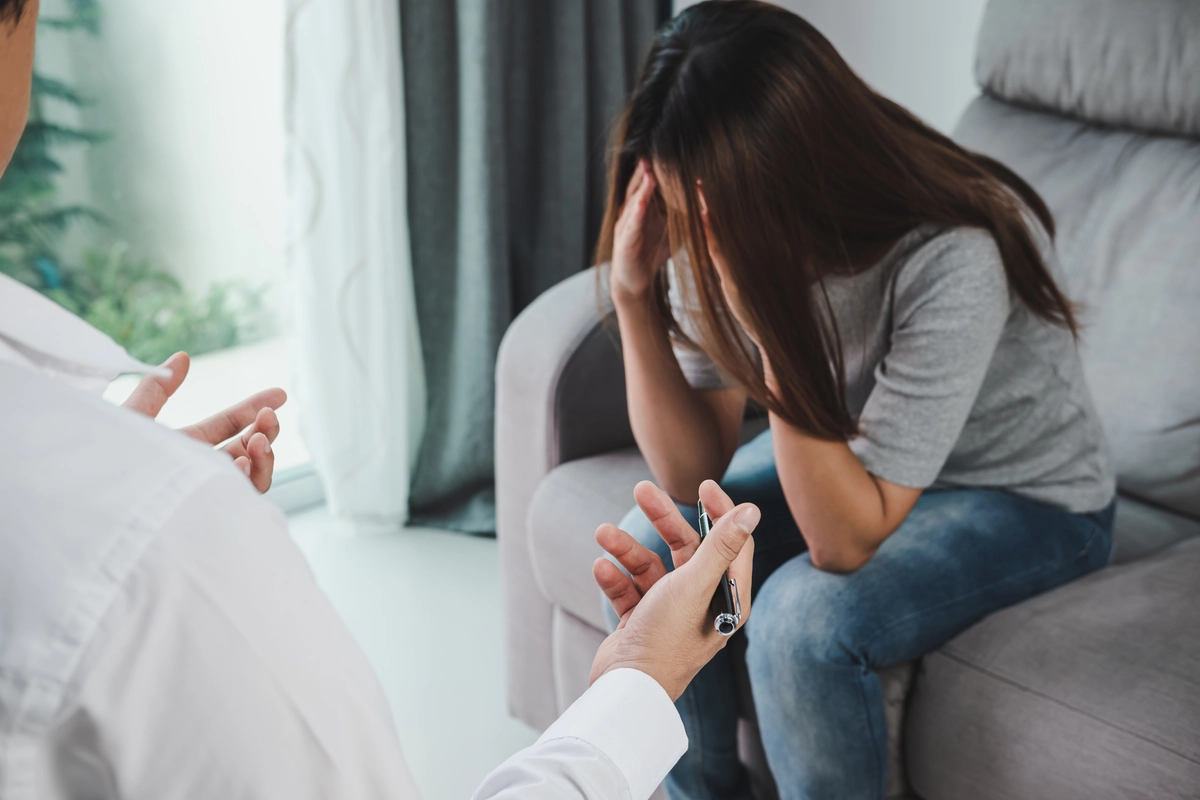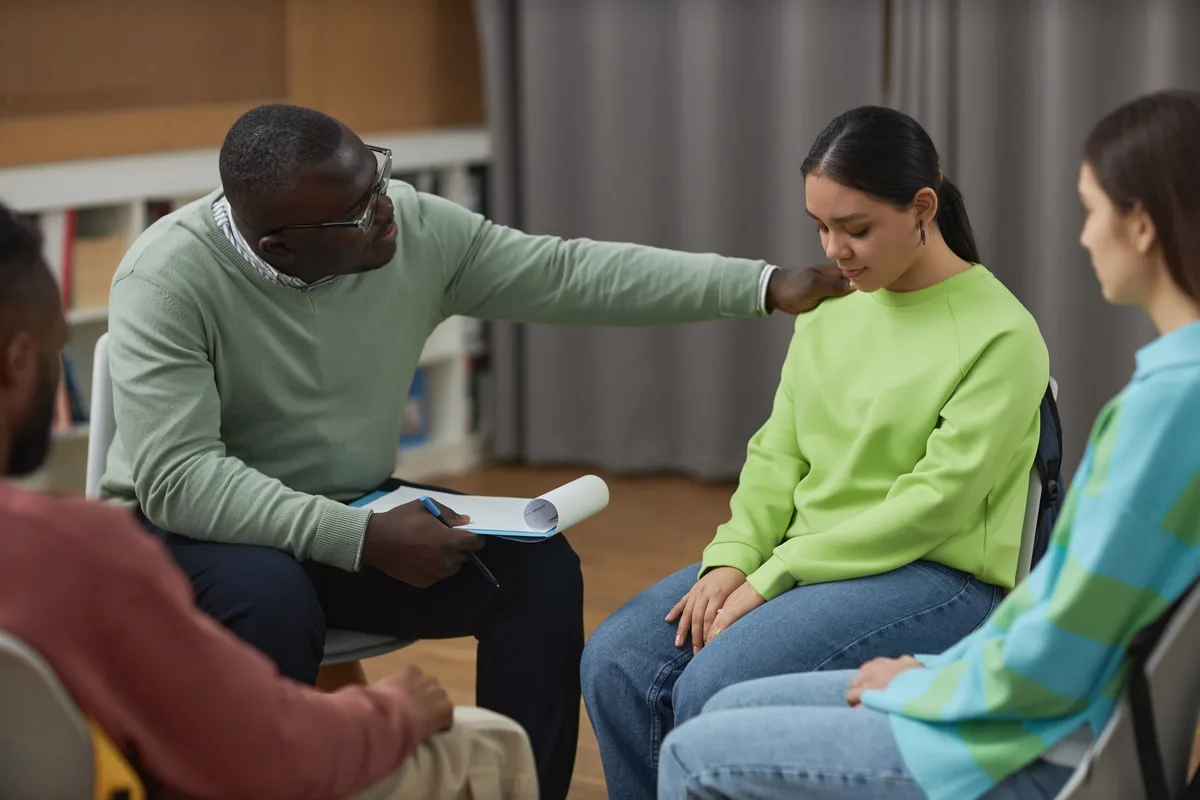24/7 Helpline:
(866) 899-221924/7 Helpline:
(866) 899-2219
Learn more about Bipolar Disorder Treatment centers in Columbiana
Bipolar Disorder Treatment in Other Cities

Other Insurance Options

Health Net

BlueShield

Private insurance

Coventry Health Care

Access to Recovery (ATR) Voucher

American Behavioral

Humana

Choice Care Network

ComPsych

Sutter

Meritain

Cigna

Lucent

Evernorth

Amerigroup

Optum

BlueCross

UnitedHealth Group

CareSource

Anthem

Magnolia Creek Treatment Center for Eating Disorders
Magnolia Creek Treatment Center for Eating Disorders is a residential treatment program located in C...



Gateway
Gateway is a private rehab located in Pelham, Alabama. Gateway specializes in the treatment of dual ...

Shelby County Treatment Center
Shelby County Treatment Center is a private rehab located in Alabaster, Alabama. Shelby County Treat...

Chilton – Shelby Mental Health Center
Chilton-Shelby Mental Health Center offers treatment for mental health and chemical dependency. Chil...

Bradford Health
Bradford Health Services provides outpatient and intensive outpatient treatment for individuals with...

Chilton Shelby Mental Health Center – Mitchell Center
Chilton Shelby Mental Health Center–Mitchell Center provides comprehensive psychiatric care and addi...

Mid South Health Systems
Mid-South Health Systems - Newman Drive offers outpatient programs for individuals with mental healt...

Mountainside Treatment Center – Wilton
Mountainside Treatment Center offers outpatient services, recovery coaching, and medication-assisted...

Mitchell County Mental Health
Mitchell County Mental Health provides an array of support and services to those affected by mental ...

North Suffolk – Chelsea Counseling Center
North Suffolk – Chelsea Counseling Center is a private rehab located in Chelsea, Massachusetts. Nort...

Noddles Island Multi Service Agency
Noddles Island Multi Service Agency is a non-profit rehab located in Chelsea, Massachusetts. Noddles...

Bay Cove Human Services – Substance Abuse Programs
Bay Cove Human Services – Substance Abuse Programs is a private rehab located in Chelsea, Massachuse...

South Bay Community Services – Chelsea Outreach Program Center
South Bay Community Services - Chelsea Outreach Program Center treats each individual with specific ...

Oxford House Hooper Street
Oxford House Hooper Street is a non-profit rehab located in Chelsea, MA. Oxford House Hooper Street ...

Child and Family Services – Saginaw
Child and Family Services – Saginaw is a private rehab located in Saginaw, Michigan. Child and Famil...

List Psychological Services
List Psychological Services is a private group practice specializing in behavioral health care; incl...

Saginaw Psychological Services
Saginaw Psychological Services is a private rehab located in Saginaw, Michigan. Saginaw Psychologica...

Saginaw Odyssey House
Saginaw Odyssey House is a 30 bed Long Term Residential Women’s Specialty Program for Women with Chi...

Saginaw County Community Mental Health
Saginaw County Community Mental Health is a public rehab located in Saginaw, Michigan. Saginaw Count...

DOT Caring Centers
DOT Caring Centers is a low-cost rehab located in Saginaw, Michigan. DOT Caring Centers specializes ...

Victory Clinical Services IV
Victory Clinical Services IV is a private rehab located in Saginaw, Michigan. Victory Clinical Servi...

Pathways Chemical Dependency
Pathways Chemical Dependency is a private rehab located in Saginaw, Michigan. Pathways Chemical Depe...

United Psychological Services
United Psychological Services is a private rehab located in Shelby, Michigan. United Psychological S...

Great Lakes Psychology Group
Great Lakes Psychology Group is a private rehab located in Shelby, Michigan. Great Lakes Psychology ...

Therapy and Counseling Services Saginaw County
Therapy and Counseling Services Saginaw County is a private rehab located in Saginaw, Michigan. Ther...

Sacred Heart Rehabilitation Center
Sacred Heart Rehabilitation Center - East Genesee street is a not-for-profit behavioral healthcare o...

Helena Valley Addiction Services
Helena Valley Addiction Services (HVAS), situated in Helena, Montana, is a substance abuse rehab ded...

AWARE
AWARE is a private rehab located in Helena, Montana. AWARE specializes in the treatment of dual diag...

Intermountain – Outpatient
Intermountain – Outpatient is a private rehab located in Helena, Montana. Intermountain – Outpatient...

Family Services – Alcohol and Drug Counseling
Family Services – Alcohol and Drug Counseling is a private rehab located in Pelham, New York. Family...

Abraxas Ohio
Abraxas is a youth oriented drug and alcohol addiction recovery center in the heart of Shelby, Ohio....

Catalyst Life Services
Catalyst Life Services is located in Shelby, Ohio. Catalyst Life Services offers client focused beha...





























































































Chilton – Shelby Mental Health Center – Family & Youth
Chilton-Shelby Mental Health Center - Family & Youth offers treatment for mental health and chemical...

Chilton Shelby Mental Health Center – J Michael Horsley Home
Chilton Shelby Mental Health Center–J. Michael Horsley Home provides comprehensive psychiatric care ...

Chilton – Shelby Mental Health Center – Hamilton Center
Chilton Shelby Mental Health Center–Hamilton Center, in Calera, Alabama, provides psychiatric care a...

Chilton Shelby Mental Health Center – Richard L Parris Home
Chilton Shelby Mental Health Center–Richard L. Parris Home, in Calera, Alabama, offers comprehensive...

Assistance Plus
Assistance Plus is a private rehab located in Wilton, Maine. Assistance Plus specializes in the trea...

Somerset County Behavioral Health
Somerset County Behavioral Health is a public rehab located in Westover, Maryland. Somerset County B...

EDM Treatment Center
EDM Treatment Center is a private rehab located in Saginaw, Michigan. EDM Treatment Center specializ...

Westlund Guidance Clinic
Westlund Guidance Clinic is a private rehab located in Saginaw, Michigan. Westlund Guidance Clinic s...

HelpNet Counseling Services
HelpNet Counseling Services is a private rehab located in Saginaw, Michigan. HelpNet Counseling Serv...

Ascension Eastwood Behavioral Health at Schoenherr
Eastwood Clinics - Shelby Township is a non-profit rehab located in Utica, MI. Eastwood Clinics - Sh...

Insight Recovery Center
Insight Recovery Center is a private rehab located in Saginaw, Michigan. Insight Recovery Center spe...

Alano Club
Alano Club is a non-profit rehab located in Saginaw, Michigan. Alano Club specializes in the treatme...

Holy Cross Counseling
Holy Cross Counseling is a private rehab located in Saginaw, Michigan. Holy Cross Counseling special...

Professional Psychological & Psychiatric Services
PPPS is a comprehensive outpatient mental health and substance abuse treatment clinic offering psych...

CADT – NE Regional Corrections Treatment Program
CADT - NE Regional Corrections Treatment Program offers licensed outpatient treatment to men serving...

Bicycle Health – Montana
Bicycle Health - Montana is an online Medication Assisted Treatment Program. Bicycle Health - Montan...

Center for Mental Health
Center for Mental Health is a private rehab located in Helena, Montana. Center for Mental Health spe...

AA – Alcoholics Anonymous – Gallatin Avenue
AA – Alcoholics Anonymous – Gallatin Avenue is a non-profit rehab located in Helena, Montana. AA – A...

AA – Alcoholics Anonymous – East Lyndale Avenue
AA – Alcoholics Anonymous – East Lyndale Avenue is a non-profit rehab located in Helena, Montana. AA...

Crawford Rehabilitation Services
Crawford Rehabilitation Services is a private rehab located in Helena, Montana. Crawford Rehabilitat...

Genesis Counseling
Genesis Counseling is an outpatient rehab located in Helena, MT. Genesis Counseling specializes in t...

Center for Mental Health
Center for Mental Health is a private rehab located in Shelby, MT. Center for Mental Health speciali...

Footprints Carolina
Footprints Carolina is a private rehab located in Shelby, North Carolina. Footprints Carolina specia...

Behavioral Wellness Center
Behavioral Wellness Center is a private rehab located in Shelby, North Carolina. Behavioral Wellness...

Phoenix Counseling Center
Phoenix Counseling Center is a private rehab located in Shelby, NC. Phoenix Counseling Center specia...

Center for Assessment and Treatment
Center for Assessment and Treatment is a private rehab located in Shelby, North Carolina. Center for...

Crossroads Treatment and Counseling Services
Crossroads Treatment and Counseling Services is a private rehab located in Wilsonville, Oregon. Cros...




















































































































































































































